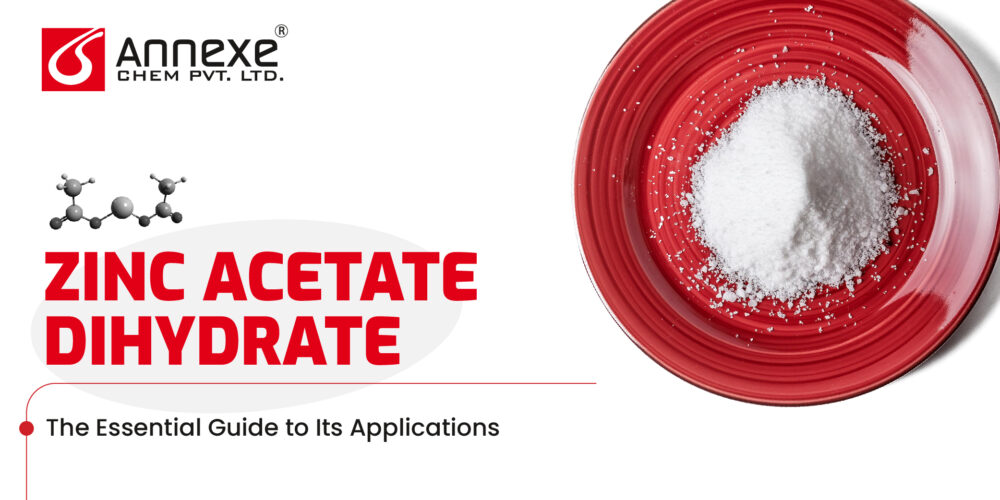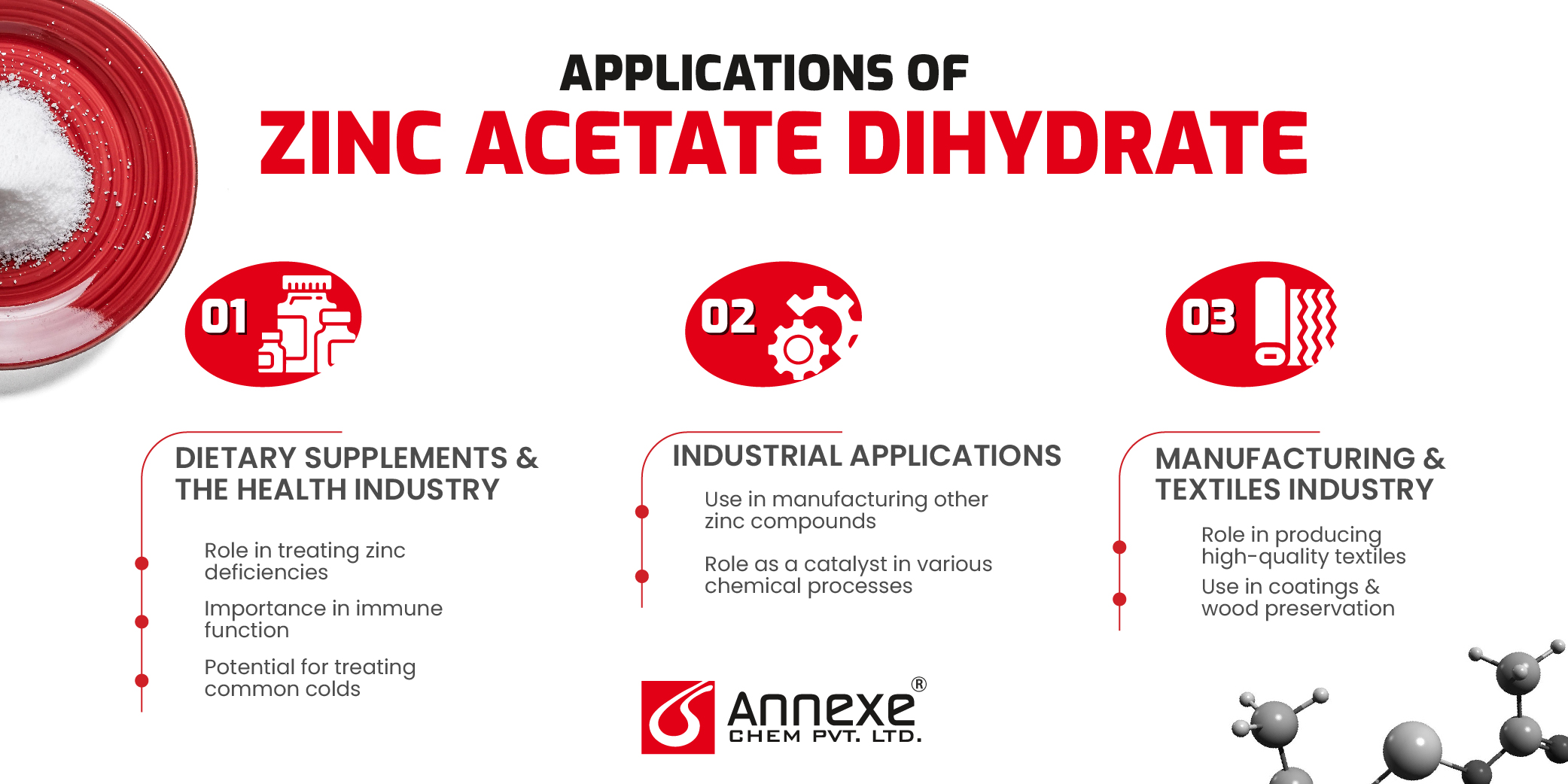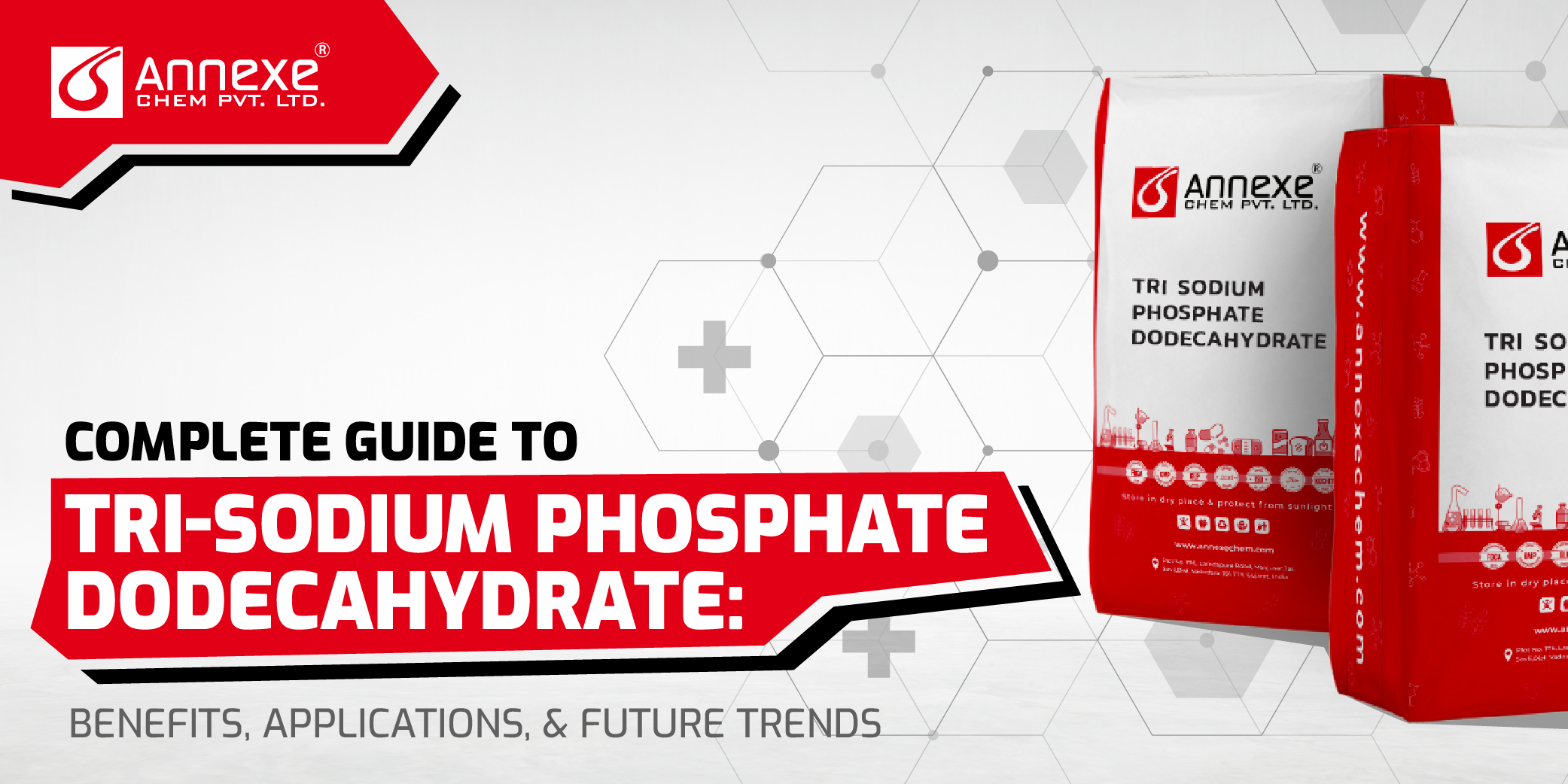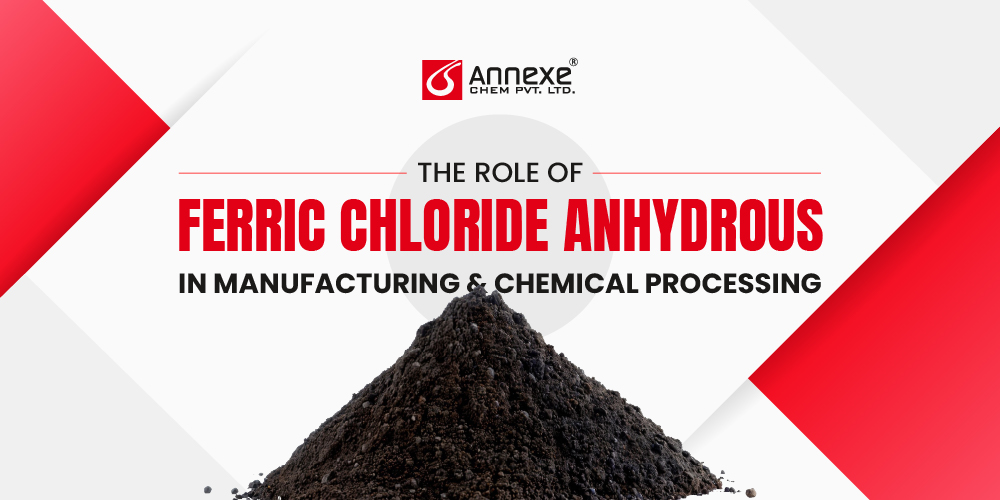Zinc Acetate Dihydrate: The Essential Guide to Its Applications - Annexe Chem Pvt Ltd
Zinc Acetate Dihydrate: The Essential Guide to Its Applications

- May 28, 2024
- By Akshita Patel
In a world continually seeking advances in healthcare and industry, minute players often make substantial impacts – and Zinc Acetate Dihydrate is one such unsung hero. Known for its versatility, this crystalline solid has carved its niche in realms ranging from medicine to manufacturing. However, its significance often lies shrouded behind its complex chemical nomenclature, leaving many to wonder about the practicality of this zinc compound.
Welcome to our comprehensive dive into the wonders of Zinc Acetate Dihydrate. Whether you’re a health enthusiast curious about this mineral’s role in your supplements, an industrial professional eyeing its utility in synthesis, or simply a keen learner, this blog will unpack everything you need to know about this multifunctional compound.
What is Zinc Acetate Dihydrate?
Understanding the essence of Zinc Acetate Dihydrate requires us to delve into its core components and characteristics. To the uninitiated, chemical compounds can seem like dense and inaccessible territory, but Zinc Acetate Dihydrate holds a simple beauty in its structure and form.
Chemical Composition & Structure
At the very center of Zinc Acetate Dihydrate lies zinc, a metal you might know from its application in rustproofing or its essential role in human nutrition. When zinc is bound to acetic acid, a relatively mild organic acid found in vinegar, we get zinc acetate. But Zinc Acetate Dihydrate takes it a step further. Each molecule consists of two zinc atoms linked to four acetate groups (CH₃COO), and, as the name suggests, the dihydrate part means that for every one of these zinc acetate units, there are two water molecules (H₂O) embedded within the crystalline structure.
Physical Properties
Physically, Zinc Acetate Dihydrate often appears as a white, crystalline powder or flaky perles. It’s a form that not only looks pure but also dissolves well in water, ethyl alcohol, and other organic solvents, making it effortlessly integrable into various solutions. This solubility is one of its key attributes, enabling the compound’s ease of use in numerous applications, from medicinal treatments to the synthesis of other compounds.
Differences between Anhydrous Zinc Acetate and Zinc Acetate Dihydrate
At the heart of the distinction between anhydrous zinc acetate and Zinc Acetate Dihydrate lies their relationship with water. ‘Anhydrous’ refers to the absence of water. In this form, zinc acetate stands alone, without the water molecules present in its dihydrate counterpart. Consequently, the anhydrous version often exhibits a different set of physical properties such as a higher melting point and differences in solubility. The choice between using the anhydrous form or the dihydrate can be critical, hinging upon the requirements of the specific industrial process or health application at hand.
This nuanced contrast between the two forms of zinc acetate highlights the importance of precision in the world of chemistry, where the presence or absence of something as seemingly insignificant as water molecules can redefine the substance’s entire scope of use.

Applications of Zinc Acetate Dihydrate
Zinc Acetate Dihydrate isn’t just a compound with a complex name; it’s a versatile actor on the stage of health and industry. Its applications are wide-reaching, serving many purposes from bolstering our immune systems to fortifying the very fabrics of our everyday life.
Dietary supplements and the health industry
- Role in treating zinc deficiencies: Zinc deficiencies can lead to numerous health issues including impaired immune function, hair loss, and delayed wound healing. Zinc Acetate Dihydrate emerges as a hero in supplement form, delivering zinc in a bioavailable format. It’s a key ingredient in over-the-counter vitamin and mineral supplements, efficiently restoring zinc levels and promoting overall health.
- Importance in immune function: The role Zinc Acetate Dihydrate plays in the body extends to immune system support. Zinc is crucial for the maintenance and development of immune cells, and its presence in the body can help bolster the body’s ability to fight off infection. This means that regular intake via supplements, under guidance, may serve as a foundational block for a robust immune defense.
- Potential for treating common colds: Explorations into the therapeutic potential of Zinc Acetate Dihydrate have demonstrated its efficacy in shortening the duration of the common cold when taken in lozenge form at the onset of symptoms. Its purported ability to inhibit the replication of the rhinovirus — the most common viral infective agent in humans — places it on the front lines of simple yet effective treatment options.
Industrial Applications
- Use in manufacturing other zinc compounds: Zinc Acetate Dihydrate serves as a precursor in the synthesis of other zinc-based chemicals. The purity and reactivity of Zinc Acetate Dihydrate make it a valuable starting material for producing zinc oxide or zinc sulfate, which are pivotal in everything from agriculture to electronics.
- Role as a catalyst in various chemical processes: In industry, Zinc Acetate Dihydrate acts as a catalyst — a substance that speeds up chemical reactions without being consumed itself — in the production of polyesters, alkyds, and other synthetic fibers. Its efficiency as a catalyst allows for smoother and more sustainable production processes.
Manufacturing & Textiles Industry
- Role in producing high-quality textiles: The textile industry benefits from Zinc Acetate Dihydrate’s application in the production of high-performance fabrics. Its use in stabilizing and improving the dye adherence to fibers ensures that fabrics retain their vibrant colors over time and under stressful conditions like washing and exposure to sunlight.
- Use in coatings and wood preservation: Beyond textiles, Zinc Acetate Dihydrate finds its way into the world of materials science as a component in protective coatings that prevent corrosion on metal surfaces. In wood preservation, it works to safeguard wood from decay, pests, and mold, extending the life of wooden structures and products.
Other Unique Applications
Zinc Acetate Dihydrate’s applications indeed stretch into various unique niches. In the pharmaceutical industry, it’s used as a buffer in insulin formulations for diabetics. It acts as a taste enhancer in certain food products, leveraging zinc’s natural ability to modulate taste perceptions. In environmental engineering, it’s even used for the removal of phosphates and sulfides from wastewater, showcasing its role in eco-friendly initiatives.
Diverse and indispensable, Zinc Acetate Dihydrate’s functionalities illuminate the intersection between science and daily life – a compound that not only cures and constructs but also paves the way for future innovations.
Behind every application of Zinc Acetate Dihydrate lies a necessary partnership with reliable suppliers who not only provide the compound but also uphold the highest standards of quality and efficacy. This is where Annexe Chem Private Limited comes into the equation. Since 2001, and more formally since 2008, Annexe Chem has carved out a reputation for excellence in the fine chemicals business. Choosing Annexe Chem as your source for Zinc Acetate Dihydrate comes with the assurance of rigorous quality control provided by advanced technology and an in-house GLP-certified laboratory. Everything, from production to packaging, is executed with utmost precision to maintain the pristine composition necessary for such a utility-driven substance.
Thank you for joining us on this scientific sojourn, and should you seek to source Zinc Acetate Dihydrate, look no further than the excellence and innovation embodied by Annexe Chem Private Limited.

Akshita Patel
As an advocate for sustainability, Akshita is committed to driving positive change within the chemical industry. She actively seeks out environmentally friendly solutions and promotes the adoption of sustainable practices. Akshita believes that a balance between economic growth and ecological responsibility is crucial for the industry's long-term success. She is dedicated to finding innovative ways to minimize environmental impact while maximizing efficiency and profitability.
Related Blogs

- July 17, 2024
- By Akshita Patel
Complete Guide to Tri-Sodium Phosphate Dodecahydrate: .
Imagine a versatile compound that seamlessly integrates into your daily life, making your cleaning products more.

- February 22, 2025
- By Akshita Patel
The Role of Ferric Chloride Anhydrous.
Imagine a world without clean drinking water, advanced electronics, or high-quality metal refining. Sounds impossible, right?.



